Albania in the Eurovision Song Contest
Albania has participated in the Eurovision Song Contest 16 times since its debut in 2004, and has placed in the top ten two times. Festivali i Këngës, a long-standing song contest that takes place every year in Albania since 1962, is used to select the country's entrant for that year's Eurovision Song Contest.
| Albania | |
|---|---|

| |
| Member station | Radio Televizioni Shqiptar (RTSH) |
| National selection events |
Internal selection
|
| Participation summary | |
| Appearances | 16 (9 finals) |
| First appearance | 2004 |
| Best result | 5th: 2012 |
| External links | |
| Albania's page at Eurovision.tv | |
Albania in the Eurovision Song Contest 2021 | |
Albania participated in the Eurovision Song Contest for the first time in 2004 with Anjeza Shahini placing seventh. It remained the country's highest result in the contest until 2012, when Rona Nishliu finished fifth. In 2020, despite having determined its representative, the country was unable to participate, due to the contest's cancellation because of the COVID-19 pandemic in Europe.
History
2000s
The national broadcaster of Albania, Radio Televizioni Shqiptar (RTSH), made the country's debut at the 2004 contest in Istanbul with the song "The Image of You" performed by Anjeza Shahini.[1][2] The country received 106 points in the grand final and finished in the seventh place remaining the country's highest placement until 2012.[3] In 2005, due to the country's top 11 placement the previous year, the succeeding entry "Tomorrow I Go" by Ledina Çelo automatically qualified for the grand final and reached the sixteenth place in Kyiv. The following year, Luiz Ejlli and his entry "Zjarr e ftohtë" failed to qualify for the grand final in Athens simultaneously marking the first time in their participation history.
The 2007 entry was Frederik Ndoci with "Hear My Plea", performed at Festivali I Këngës 45 as "Balada e gurit" (The stone ballad). The song was performed at Eurovision in both English and Albanian. In the semi-final of the 2007 contest he received 49 points, placing 17th of 28 in his semi-final and failing to qualify for the final.
The winner of Festivali I Këngës 46 was "Zemrën e lamë peng" (Hearts trapped in time) by Olta Boka. However the result of the juries that selected the winner was controversial and rumours arose that the final two judges intentionally awarded high marks to Boka in order to avoid sending the runners-up, Flaka Krelani and Doruntina Disha, to the contest. Press reactions in Albania were not happy with the decision, and RTSH announced that they would investigate into alleged cheating by the final two judges to award their points.[4][5] Despite this, Olta Boka's victory remained, and she sang for Albania at the Eurovision Song Contest 2008 in Belgrade, Serbia. She qualified for the final, coming 9th in a field of 19 in the second semi-final, and in the final she received 55 points, coming equal 17th in a field of 25.
Albania was the first country to select both their artist and publicly present their song for Eurovision 2009. The winner was again selected by Festivali I Këngës. The winner of Festivali I Këngës 47 was Kejsi Tola with the song "Më merr në ëndërr" (Take me in your dreams), which was composed by the composers of Albania's first entry Edmond Zhulali and Agim Doçi.[6] The song was performed in English as "Carry Me in Your Dreams".[7] Albania finished 7th out of 19 in the 2nd semifinal with 73 points, thus qualifying for the final. In the final, where both jury and televoting were used, Albania scored 48 points, finishing 17th in a field of 25. However, had only televoting been used Albania would have placed 11th in the contest. Conversely if only jury voting had been used Albania would have placed 23rd.[8]
2010s
The winner of Festivali I Këngës 48 was decided on 27 December, with Juliana Pasha winning over former winner Anjeza Shahini. She represented Albania at Eurovision 2010 in Oslo with the song "It's All about You".[9][10] The song was a typical up-tempo composition, and has been compared to Christina Aguilera's "Keeps Gettin' Better"[11] and Britney Spears' "Womanizer".[12] Albania came 6th in the first semi-final with 76 points, thus qualifying for the final. In the final, Juliana finished 16th with 62 points which included 12 points from Macedonia.
The Albanian participant for the 2011 Eurovision Song Contest was chosen in Festivali i Këngës 49 in December 2010. The winner of 2011's Festival of Song was Aurela Gaçe, winning for the third time after 10 years. Her song was named "Kënga ime" ("My Song") and it was translated into English with the name "Feel the Passion", published on 12 March 2011, during a show called "Historia nis këtu" ("The story begins here") in RTSH. Albania participated in Semi-Final 1 against 18 other countries, fighting for a place in the grand final in 14 May. However they missed out on qualification for the final for the first time in 4 years, coming 14th.
Albania competed in the 2012 competition with the song "Suus", which was performed by Rona Nishliu. The song got through to the final, coming in 5th place overall with 146 points. Rona Nishliu from Kosovo achieved a record result for Albania.[13]
Albania competed in the 2013 Eurovision Song Contest with the song "Identitet" which was performed by Adrian Lulgjuraj and Bledar Sejko. This song was chosen as the winner through the Festivali i Këngës. The results depended on the jury voting only. Among the experts in the jury was the Italian Head of Delegation at the Eurovision Song Contest, Nicola Caligiore, who greeted and gave the points in English for all the viewers from the Eurovision.tv webcast. [14] Albania came 14th in the second semi-final of the 2013 Eurovision Song Contest in Malmö and did not make it into the grand final.
On 28 December 2013, Herciana Matmuja won Festivali i Këngës 52 (the 52nd national final of Albania) and was therefore chosen to represent Albania in Eurovision 2014 with her song 'Zemërimi i një nate'.[15] In the time before Eurovision 2014 she recorded both English and Albanian versions of this song.[16] On 16 March she released the final version of 'One Night's anger' for Eurovision 2014.[17] Albania failed to qualify for the second year in a row.
On 28 December 2014, Elhaida Dani won Festivali i Këngës 53 with the song "Diell", and this represented Albania at the Eurovision Song Contest 2015.[18] On 23 February 2015 it was announced that the songwriters had decided to withdraw the song and Dani would perform something else at Eurovision.[19] The following day it was revealed that Dani would perform "I'm Alive".[20]
On 27 December 2015 Eneda Tarifa won Festivali i Këngës 54 with her song "Përrallë" which meant she would represent Albania in the Eurovision Song Contest 2016. Albania was the first country to reveal both the artist and song together. It was later translated into English and called "Fairytale", and the music video premiered on the evening news on TVSH. Albania failed to qualify, coming only 16th out of 18 in the second semi-final.
After failing to qualify once again in 2017 with Lindita and the song "World", Albania returned to the grand final in 2018 with the song "Mall" by Eugent Bushpepa. It finished 11th of 26 in the final receiving 184 points, giving Albania its third best result in the contest since their debut. The song fared better with the juries, coming 7th in the final respectively.
In 2019, Albania selected Jonida Maliqi to represent them with the song "Ktheju tokës". Albania succeeded in qualifying from the second semi-final, making it the first time Albania had qualified twice in a row since 2009 and 2010.
2020s
For the 2020 contest, Albania selected Arilena Ara to represent their country after she won Festivali i Këngës 58 with the song "Shaj" on 22 December 2019. On 9 March 2020, a revamped version of the song named "Fall from the Sky" was released in English. However, the 2020 contest was cancelled on 18 March 2020 due to the COVID-19 pandemic in Europe.
For the 2021 contest, RTSH announced that Arilena Ara would not be internally selected to represent Albania at the Eurovision Song Contest 2021 and that Festivali i Këngës 59 would go ahead as planned. The national final took place on 23 December 2020 and was won by Anxhela Peristeri with the song "Karma". She is scheduled to represent Albania in the Eurovision Song Contest 2021 with a revamped version of her selected song, which will be released at a later date. The song will remain in Albanian.[21]
Contestants
2 |
Second place |
X |
Entry selected but did not compete |
| Year | Artist | Title | Language | Final | Points | Semi | Points |
|---|---|---|---|---|---|---|---|
| Anjeza Shahini | "The Image of You" | English | 7 |
106 |
4 |
167 | |
| Ledina Çelo | "Tomorrow I Go" | English | 16 |
53 |
Top 12 previous year[lower-alpha 1] | ||
| Luiz Ejlli | "Zjarr e ftohtë" | Albanian | Failed to qualify | 14 |
58 | ||
| Frederik Ndoci | "Hear My Plea" | English, Albanian | Failed to qualify | 17 |
49 | ||
| Olta Boka | "Zemrën e lamë peng" | Albanian | 17 |
55 |
9 |
67 | |
| Kejsi Tola | "Carry Me in Your Dreams" | English | 17 |
48 |
7 |
73 | |
| Juliana Pasha | "It's All About You" | English | 16 |
62 |
6 |
76 | |
| Aurela Gaçe | "Feel the Passion" | English, Albanian | Failed to qualify | 14 |
47 | ||
| Rona Nishliu | "Suus" | Albanian | 5 |
146 |
2 |
146 | |
| Adrian Lulgjuraj & Bledar Sejko | "Identitet" | Albanian | Failed to qualify | 15 |
31 | ||
| Hersi Matmuja | "One Night's Anger" | English | Failed to qualify | 15 |
22 | ||
| Elhaida Dani | "I'm Alive" | English | 17 |
34 |
10 |
62 | |
| Eneda Tarifa | "Fairytale" | English | Failed to qualify | 16 |
45 | ||
| Lindita | "World" | English | Failed to qualify | 14 |
76 | ||
| Eugent Bushpepa | "Mall" | Albanian | 11 |
184 |
8 |
162 | |
| Jonida Maliqi | "Ktheju tokës" | Albanian | 17 |
90 |
9 |
96 | |
| Arilena Ara | "Fall from the Sky" | English | Contest cancelled X[lower-alpha 2] | ||||
| Anxhela Peristeri | "Karma" | Albanian | |||||
Related involvement
Commentators and spokespersons
For the contest's broadcast on Radio Televizioni Shqiptar (RTSH), various commentators and spokespersons have been hired throughout the years, with Leon Menkshi and Andri Xhahu notably having done the job on eight occasions. At Eurovision, after all points are calculated, the presenters of the show call upon each voting country to invite their respective spokesperson to announce the results of their vote on-screen.
| Year | Commentator | Spokesperson | Ref. |
|---|---|---|---|
| Leon Menkshi | Zhani Ciko | ||
| Leon Menkshi | Zhani Ciko | ||
| Leon Menkshi | Leon Menkshi | ||
| Leon Menkshi | Leon Menkshi | ||
| Leon Menkshi | Leon Menkshi | ||
| Leon Menkshi | Leon Menkshi | ||
| Leon Menkshi | Leon Menkshi | ||
| Leon Menkshi | Leon Menkshi | ||
| Andri Xhahu | Andri Xhahu | ||
| Andri Xhahu | Andri Xhahu | ||
| Andri Xhahu | Andri Xhahu | ||
| Andri Xhahu | Andri Xhahu | ||
| Andri Xhahu | Andri Xhahu | ||
| Andri Xhahu | Andri Xhahu | ||
| Andri Xhahu | Andri Xhahu | ||
| Andri Xhahu | Andri Xhahu |
Awards
| Year | Performer(s) | Ref. |
|---|---|---|
| 2012 | Rona Nishliu |
Gallery
 Anjeza Shahini in Istanbul (2004)
Anjeza Shahini in Istanbul (2004)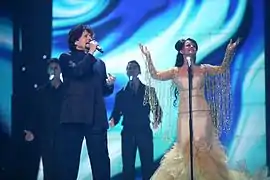 Frederik Ndoci and Aida Ndoci in Helsinki (2007)
Frederik Ndoci and Aida Ndoci in Helsinki (2007).jpg.webp)
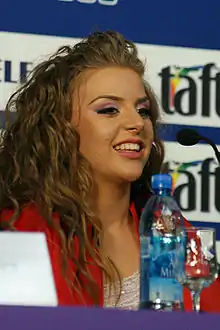 Kejsi Tola in Moscow (2009)
Kejsi Tola in Moscow (2009)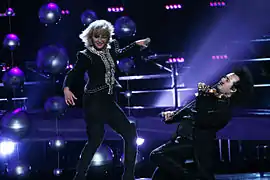 Juliana Pasha in Oslo (2010)
Juliana Pasha in Oslo (2010) Rona Nishliu in Baku (2012)
Rona Nishliu in Baku (2012)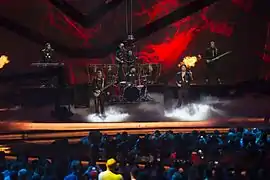
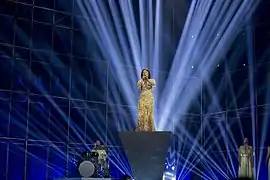 Hersi Matmuja in Copenhagen (2014)
Hersi Matmuja in Copenhagen (2014) Elhaida Dani in Vienna (2015)
Elhaida Dani in Vienna (2015)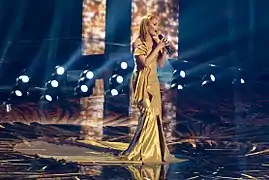 Eneda Tarifa in Stockholm (2016)
Eneda Tarifa in Stockholm (2016)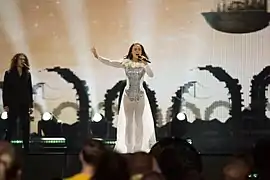
.jpg.webp) Eugent Bushpepa in Lisbon (2018)
Eugent Bushpepa in Lisbon (2018)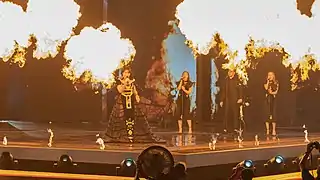 Jonida Maliqi in Tel Aviv (2019)
Jonida Maliqi in Tel Aviv (2019)
See also
Notes
- According to the then-Eurovision rules, the top ten non-Big Four countries from the previous year along with the Big Four automatically qualified for the grand final without having to compete in semi-finals. For example, if two Big Four countries were placed inside the top ten, the 11th and 12th spots would be advanced to next year's grand final, along with all countries ranked in the top ten.[22]
- The European Broadcasting Union (EBU) announced the 2020 contest's cancellation in March 2020 related to the pandemic of the coronavirus disease 2019 (COVID-19).[23]
References
- "The end of a decade: Istanbul 2004". eurovision.tv. 25 December 2009. Retrieved 2 April 2020.
- Bakker, Sietse (27 November 2002). "No new countries at next Eurovision Song Contest". esctoday.com. Retrieved 2 April 2020.
- "Eurovision Song Contest–Countries: Albania". eurovision.tv. Retrieved 2 April 2020.
- Klier, Marcus (17 December 2007). "Albania: press reaction on Festivali i Këngës". ESCToday. Retrieved 3 November 2008.
- Viniker, Barry (19 December 2007). "Albania: Festivali I Kenges result under investigation". ESCToday. Retrieved 3 November 2008.
- Klier, Marcus (21 December 2008). "Albania decided: Kejsi Tola to Eurovision!". ESCToday. Retrieved 21 December 2008.
- Hondal, Victor (8 March 2009). "Albania: Kejsi Tola to sing Carry me in your dreams". ESCToday. Retrieved 8 March 2009.
- Bakker, Sietse (31 July 2009). "Exclusive: Split jury/televoting results out!". European Broadcasting Union. Retrieved 6 August 2009.
- Klier, Marcus (27 December 2009). "Albania sends Juliana Pasha to Eurovision". ESCToday. Retrieved 27 December 2009.
- Brey, Marco (27 December 2009). "Juliana Pasha to represent Albania in Oslo!". European Broadcasting Union. Retrieved 27 December 2009.
- "Juliana Pasha's song compared to "Keeps Gettin Better"". YouTube. 29 December 2009. Retrieved 29 December 2009.
- "Juliana Pasha's song compared to "Womanizer"". YouTube. 25 December 2009. Retrieved 25 December 2009.
- "Eurovision Song Contest 2012 Grand Final". Eurovision Song Contest. Archived from the original on 22 January 2013. Retrieved 2 April 2020.
- http://www.eurovision.tv/page/news?id=adrian_lulgjuraj_and_bledar_sejko_win_festivali_i_kenges
- "Albania: Herciana Matmuja wins Wins Festivali i Këngës 52 with Zemërimi i një nate". wiwibloggs.com. 28 December 2014. Retrieved 23 March 2014.
- "Albania: Hersiana Matmuja records ESC song in two languages". wiwibloggs.com. 12 February 2014. Retrieved 23 March 2014.
- "ALBANIA: HERSIANA MATMUJA REVEALS ONE NIGHT's ANGER". wiwibloggs.com. 16 March 2014. Retrieved 23 March 2014.
- Granger, Anthony (28 December 2014). "Albania: Elhaida Dani Is Off To Vienna". Eurovoix.com. Retrieved 28 December 2014.
- Taylor, Richard (23 February 2015). "Albania: "Diell" Withdrawn". Eurovoix.com. Archived from the original on 24 February 2015. Retrieved 23 February 2015.
- Granger, Anthony (24 February 2015). "Albania: Elhaida To Sing "I'm Alive"". eurovoix. Retrieved 24 February 2015.
- Christou, Costa (26 December 2020). "Anxhela Peristeri confirms Karma will remain in Albanian for Eurovision". ESCXtra. Archived from the original on 26 December 2020.
- "Rules of the Eurovision Song Contest 2005". European Broadcasting Union (EBU). Archived from the original on 10 February 2006. Retrieved 7 January 2021.
- "Eurovision 2020 in Rotterdam is cancelled". European Broadcasting Union (EBU). 18 March 2020. Archived from the original on 21 April 2020. Retrieved 23 April 2020.
- Jensen, Charlotte (13 May 2017). "Voting order and spokespeople for Grand Final 2017". EuroVisionary. Archived from the original on 26 October 2020. Retrieved 8 January 2021.
- Bakker, Sietse (14 May 2004). "And here are the votes from... the spokespersons". esctoday.com. Archived from the original on 29 January 2007. Retrieved 19 November 2019.
- Philips, Roel (17 May 2005). "The 39 spokespersons!". esctoday.com. Retrieved 19 November 2019.
- "Running order for the voting tonight". European Broadcasting Union (EBU). 26 May 2012. Archived from the original on 18 September 2020. Retrieved 8 January 2021.
- "'Good evening Malmö'–Voting order revealed". European Broadcasting Union (EBU). 18 May 2013. Archived from the original on 23 October 2020. Retrieved 8 January 2021.
- "'Good evening Copenhagen'–Voting order revealed". European Broadcasting Union (EBU). 10 May 2014. Archived from the original on 16 December 2019. Retrieved 8 January 2021.
- Roxburgh, Gordon (23 May 2015). "'Good evening Vienna'–Voting order revealed". European Broadcasting Union (EBU). Archived from the original on 5 December 2018. Retrieved 8 January 2021.
- Roxburgh, Gordon (14 May 2016). "The 42 spokespersons for the 2016 Grand Final". European Broadcasting Union (EBU). Archived from the original on 31 July 2020. Retrieved 8 January 2021.
- "'May we have your votes please?'". European Broadcasting Union (EBU). 11 May 2018. Archived from the original on 18 December 2020. Retrieved 8 January 2021.
- "Eurovision 2019 Spokespersons–Who will announce the points?". Eurovisionworld. 18 May 2019. Archived from the original on 2 June 2019. Retrieved 8 January 2021.
- "Rona Nishliu wins the Barbara Dex Award". European Broadcasting Union (EBU). 4 June 2012. Archived from the original on 15 October 2020. Retrieved 7 January 2021.